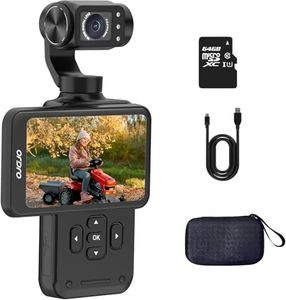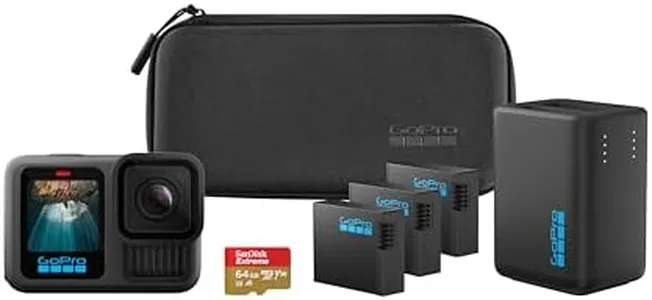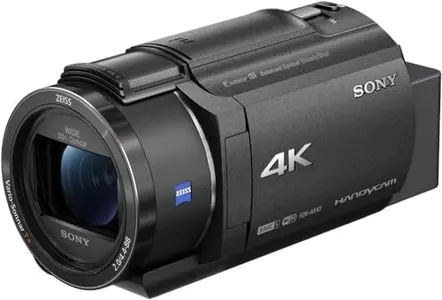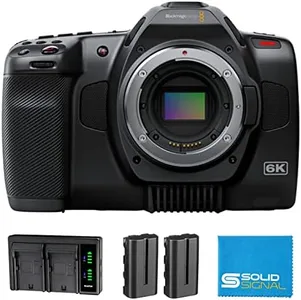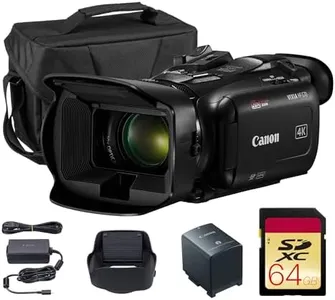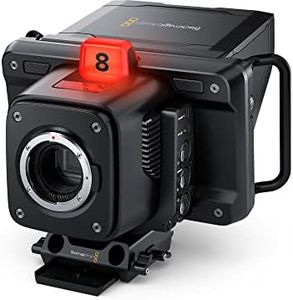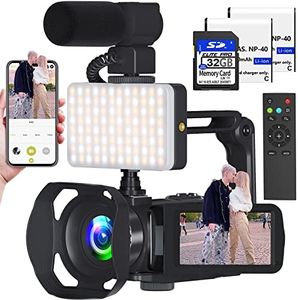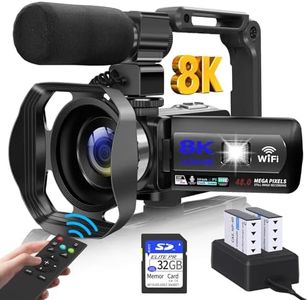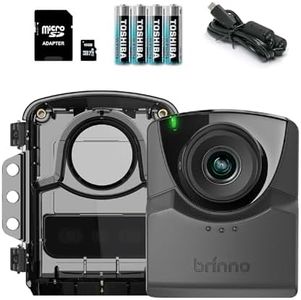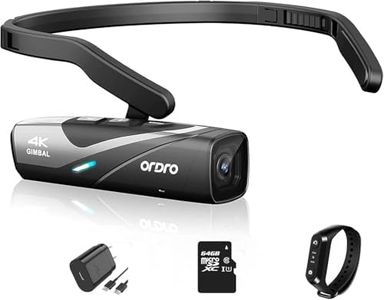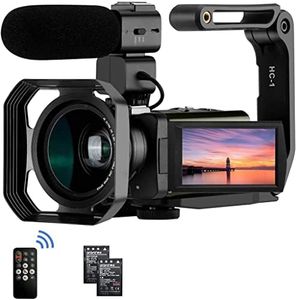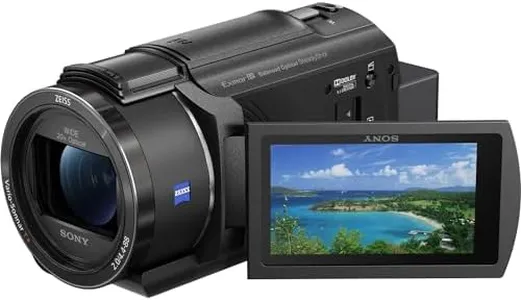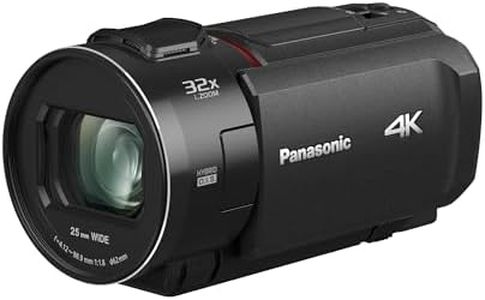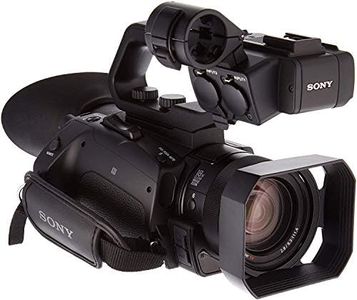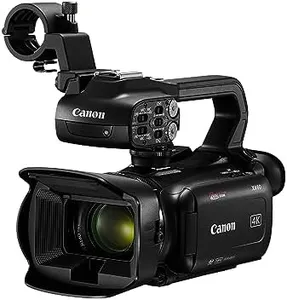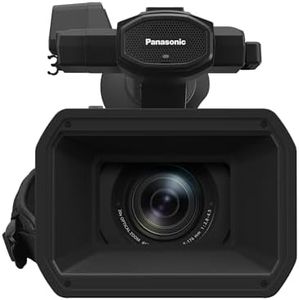10 Best Camcorders 2026 in the United States
Our technology thoroughly searches through the online shopping world, reviewing hundreds of sites. We then process and analyze this information, updating in real-time to bring you the latest top-rated products. This way, you always get the best and most current options available.

Our Top Picks
Winner
GoPro HERO13 Black Extended Power Bundle - Includes Dual Battery Charger, 3 Enduro Batteries, 64GB SanDisk microSD Card, Camera Case
Most important from
1953 reviews
The GoPro HERO13 Black Extended Power Bundle is a versatile and rugged action camcorder designed mainly for outdoor and adventure filming. It stands out with its top-tier 5.3K video resolution, offering superb image clarity that beats standard 4K cameras by a big margin. This makes it great for capturing detailed, high-quality footage and extracting sharp photos from video. The built-in CMOS sensor supports multiple specialty lenses, including ultra-wide, macro, and anamorphic options, allowing creative flexibility for different shot styles.
Stabilization is strong, as expected from GoPro, helping produce smooth videos even in active scenarios. While it lacks optical zoom, the camera’s fixed maximum focal length of 34mm suits wide-angle action shots rather than zoomed-in filming. Audio is recorded in common formats (AAC, MP3), but being a compact action cam, it won’t match dedicated camcorders with advanced mics—still good for casual use. Battery life is enhanced in this bundle with three Enduro batteries and a dual charger, addressing a common concern for long shoots. A 64GB microSD card is included, ensuring decent storage out of the box. Connectivity via USB-C is straightforward for transfers and charging. The camera is compact and lightweight (just under 14 ounces), making it highly portable and easy to mount.
Its rugged, waterproof design (up to 33ft) ensures reliability in rough environments, perfect for action sports but less conventional for everyday video recording or zoom-heavy shooting. The small 2.27-inch screen is adequate for framing but small compared to traditional camcorders. The HERO13 Black excels as an action camcorder with stunning resolution, strong stabilization, and robust accessories, ideal for adventure seekers and creative videographers. However, it may not fully replace a traditional camcorder for users needing optical zoom, advanced audio, or longer battery life without spare batteries.
Most important from
1953 reviews
Sony FDR-AX43 UHD 4K Handycam Camcorder
Most important from
269 reviews
The Sony FDR-AX43 UHD 4K Handycam Camcorder stands out with its ability to capture stunning 4K video, thanks to its 1/2.5” Exmor R CMOS sensor which performs well even in low light conditions. The camcorder's built-in gimbal and Balanced Optical SteadyShot image stabilization are crucial for reducing camera shake, making it ideal for shooting smooth videos on the go. With a 20x optical zoom and Clear Image Zoom that extends to 30x for 4K and 40x for HD, it provides versatility in capturing distant subjects clearly.
The fast and intelligent autofocus also ensures that your subjects remain sharp and in focus, which is great for capturing decisive moments effortlessly. The 26.8mm wide-angle ZEISS Vario-Sonnar T lens offers a broader field of view, perfect for landscapes or group shots. Additionally, digital zoom extends up to 250x, though this may result in some loss of image quality. On the audio front, it supports AAC format, which should suffice for most casual users. However, those seeking professional-grade audio might find it limiting.
Battery life and storage options are not explicitly detailed but given its SDHC flash memory type and compact size, it is likely intended for moderate usage. Wi-Fi and NFC connectivity add to its convenience, enabling easy sharing and remote control features. Weighing in at a manageable size with a 3-inch screen, it is portable and user-friendly. This camcorder is a solid choice for hobbyists and semi-professional videographers looking for a feature-packed, reliable device for everyday video recording.
Most important from
269 reviews
Blackmagic Design Pocket Cinema Camera 6K Pro (CINECAMPOCHDEF06P) – Bundle Includes Two (2) Additional NP-F570 Batteries, Dual Battery Charger, and SolidSignal Microfiber Cloth
Most important from
31 reviews
The Blackmagic Design Pocket Cinema Camera 6K Pro is a powerful choice for those who want professional-level video quality with a super 35 sensor and an impressive resolution of 6144 x 3456 pixels, which is great for detailed, cinema-quality footage. Its 13 stops of dynamic range and high ISO capability help capture clear images even in challenging light. The camera lacks traditional optical zoom, so lens choice matters here, but it supports EF/EF-S lenses giving flexibility. It has built-in ND filters which is handy for controlling light without extra gear.
Audio options are solid with a built-in stereo mic and inputs for external microphones, which is a plus for capturing quality sound. Battery life is improved with two included NP-F570 batteries and a dual charger, helping avoid downtime. Storage is versatile with SD, CFast 2.0, and external SSD support through USB-C, which suits various workflows. Connectivity includes Bluetooth and USB, allowing for easy file transfer and control.
The camera’s size and weight are relatively manageable thanks to a carbon fiber composite body, but it remains larger than typical consumer camcorders, reflecting its professional focus. Its bright, adjustable 5-inch HDR touchscreen simplifies framing and menu navigation. This camcorder suits filmmakers, content creators, or serious hobbyists who prioritize image quality and flexibility over compact size or zoom capability.
Most important from
31 reviews
Buying Guide for the Best Camcorders
Choosing the right camcorder can be a daunting task, but with the right knowledge, you can find the perfect one to suit your needs. Camcorders come with a variety of features and specifications that can greatly impact your recording experience. Understanding these key specs will help you make an informed decision and ensure you get the best camcorder for your needs.FAQ
Most Popular Categories Right Now
